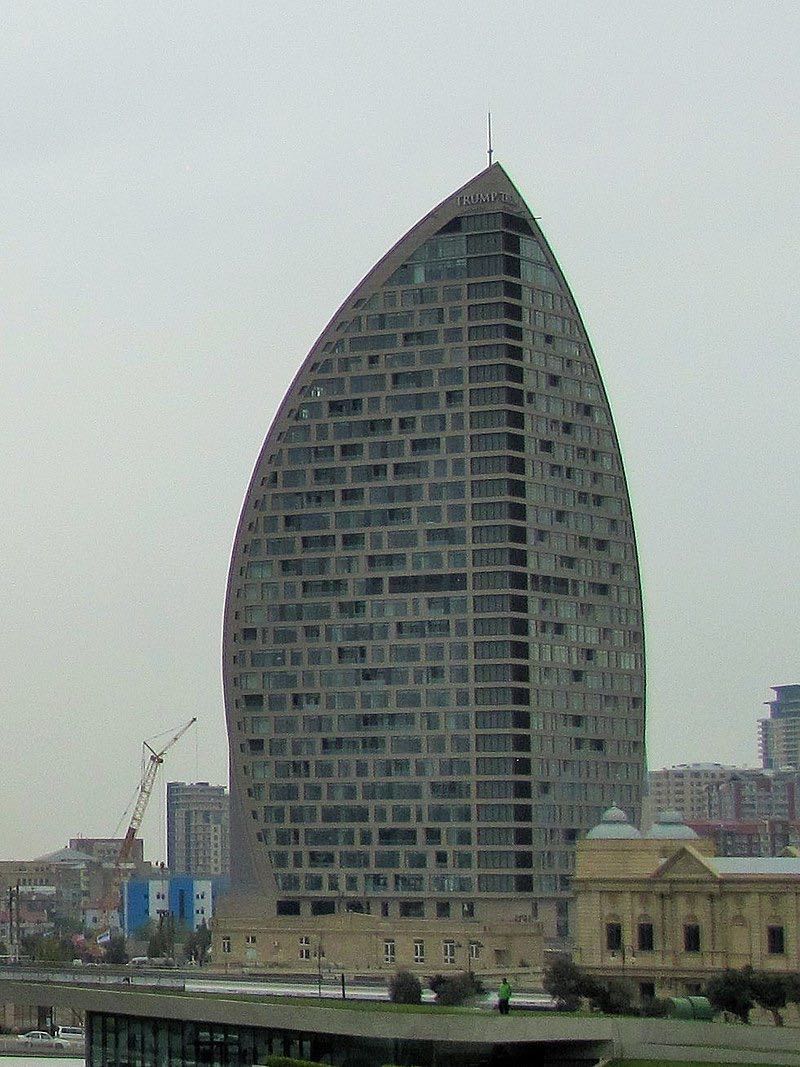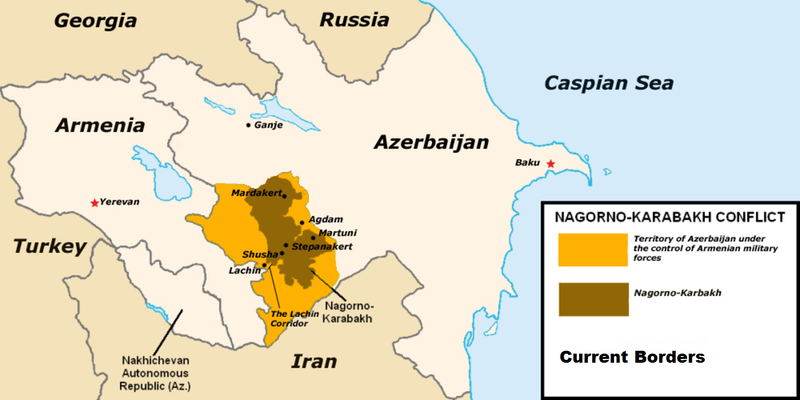Two new factors make the hostilities, which erupted between Armenia and Azerbaijan over the enclave Nagorno-Karabakh, more dangerous. For the first time Turkey is openly backing one of the parties, Azerbaijan, and the United States is unusually disengaged. Russia has leverage, but will never be able to deliver a peace agreement on its own. In a piece for Moscow Carnegie Center region-expert Thomas de Waal calls for serious American and European engagement to stem the conflict.
 Prime Minister of Armenia Nikol Pashinyan and President of Azerbaijan Ilham Aliyev sitting next to each other at a meeting of the CIS Heads of State Council in October last year. Photo Kremlin.ru
Prime Minister of Armenia Nikol Pashinyan and President of Azerbaijan Ilham Aliyev sitting next to each other at a meeting of the CIS Heads of State Council in October last year. Photo Kremlin.ru
by Thomas de Waal
'If in the first act of the play you have hung a pistol on the wall, then it must be fired in the following act.'
A European official who has spent years trying to negotiate over the Nagorno-Karabakh dispute, the longest-running conflict in wider Europe, is fond of this quotation by Anton Chekhov.
On Sunday, twenty-six years after a ceasefire agreement was reached that both sides had mostly observed, the pistol was fired. Heavy fighting has broken out. Why now? Because of long pent-up frustrations, but also because of a specific historical moment.
Oldest conflict in post-Soviet space
Lest anyone forget, this is the oldest ethno-territorial conflict in the post-Soviet space. The dispute began as a political clash in 1988, when it gave Mikhail Gorbachev sleepless nights. It turned into an armed conflict between the two independent nations of Armenia and Azerbaijan as the USSR dissolved. The two sides stopped fighting in 1994 after a Russian-mediated ceasefire left an Armenian military victory on the ground. But the conflict itself was not resolved. Azerbaijan had lost not only the disputed territory of Karabakh itself, which had an Armenian majority population in Soviet times, but—wholly or partially—seven regions of Azerbaijan which were never under dispute but are still controlled by Armenian forces.
Nagorno-Karabakh and surrounding Azerbajani territory under control of Armenia. Map Wikipedia
After 1994 the ceasefire zone could be quiet, sometimes for years on end, but there was never a truce in the aggressive rhetoric the two sides employed against each other. There were no peacekeepers on the ground. And both countries underwent a fearsome militarization, buying heavy artillery, attack aircraft, drones, and long-range missiles.
For four days in April 2016, Chekhov’s gun fired, and around 200 people lost their lives, before the Russians were able to broker another ceasefire.
Geopolitical equilibrium is broken
The fighting this week looks more serious still. Given that public expectations in both societies run extremely high, it will be harder for the leaders to stop soon and claim success. The risk of escalation and of mass destruction is alarmingly high.
Two new factors make the situation more dangerous. The first is that while, as usual, most countries are calling for de-escalation and a ceasefire, for the first time, a major power and neighbour—Turkey—is openly backing one of the parties to the conflict, Azerbaijan.
For almost 30 years, Turkey has been a member of the only international body mediating the conflict, the so-called Minsk Group of the Organization for Security and Cooperation (OSCE) in Europe. As such, Turkey has always given political support to Azerbaijan, but also been a restraining influence on its Turkic brother in Baku, calling for the peaceful settlement of the conflict. Those days are now over, and the geopolitical equilibrium that prevailed around the conflict is broken.
Trump tower in Baku
The second factor is that the United States is unusually disengaged.Since 1998 Washington has been one of three co-chairs of the Minsk Group mediation effort. In 2001, the presidents of Armenia and Azerbaijan met in Key West, Florida, for a major U.S.-mediated meeting that briefly seemed to offer a solution to the conflict. Yet on September 27, Washington was the last major international actor to issue a statement.
This is an indication of a general American retreat from interest in this region, and perhaps in this specific case, evidence that the president—sponsor of the never-completed Trump Tower in Baku—views Armenia and Azerbaijan only from a business perspective.
 Unfinished 33-floor hotel and condominium tower in Baku,
Unfinished 33-floor hotel and condominium tower in Baku,
sponsored by Donald Trump. Picture CC Wikimedia
It is also a broader symptom of a world in which the United States is not acting to defuse regional conflicts. Karabakh is, after all, the third conflict zone in which Turkey is facing off against Russia, after Syria and Libya.
As for the European Union, it has never had a role in this conflict, unlike in the Balkans. When the Nagorno-Karabakh armed conflict started in the 1990s, the EU did not have the pretensions to a geopolitical role that it has now. Since 1998, France has been the third mediator but, despite periodic interventions by French presidents, it has not taken a sustained interest in resolving the conflict.
Russia—and Foreign Minister Sergei Lavrov in particular—remains the most active mediator and the only player with a genuine capacity to persuade the two sides to declare a new ceasefire. But as always, Moscow is constrained by the dense bilateral agendas it has with Baku and Yerevan, and the historical suspicions both Armenians and Azerbaijanis have of Russian intentions in the region. Russia will never be able to deliver a peace agreement on its own.
Unused international potential
All this has resulted in a great deal of unused international potential. Years have gone by with desultory diplomatic activity, and discussions over wording of a framework document that dates back to 2006 or over how many OSCE monitors should be stationed on the ground.
There is a strong and tragic sense of déjà vu this week. In May 2016, after the last round of heavy fighting, the two presidents went to Vienna and, under pressure from Lavrov and then U.S. secretary of state John Kerry, both sides agreed to demands the others had long been making. The Azerbaijani side agreed to measures strengthening the ceasefire: the main concern of the Armenians. The Armenians agreed to a resumption of “negotiations on a comprehensive settlement,' the main Azerbaijani demand.
This agreement could have extracted some benefit from the tragedy of 2016, but very quickly both sides walked back on their promises and, as usual, the international mediators did not try to make Baku and Yerevan keep their word.
The result is that negotiations continue under the aegis of the Minsk Group, but they have become purely technical, devoid of real substance. That void in real dialogue was a major contributing factor to the downward spiral that led to this week’s fighting. The Azerbaijani side had stopped believing that the current Armenian administration was ready for renewed substantial negotiations.
Urgent need for enagement of US en Europe
The Europeans and Americans may groan about this faraway conflict in the hills of the Caucasus, with an unpronounceable name, but they will ultimately have no option but to engage with it more seriously—and in partnership with Russia, whatever their differences on other issues. Turkey’s involvement, Iran’s proximity, and the presence of major oil and gas pipelines all make this a region where a local flare-up can quickly turn into an international headache.
There is also, of course, a humanitarian imperative. Last time around, about 20,000 people died and more than one million were displaced from their homes. It is unacceptable that the same thing could happen in two European countries again. In 1992, the newly formed Minsk Group called for an international conference to resolve the conflict, but it never happened. It is time to convene that conference.
We republished this article with permission from Carnegie Moscow Center
For further background see earlier article by Thomas de Waal

